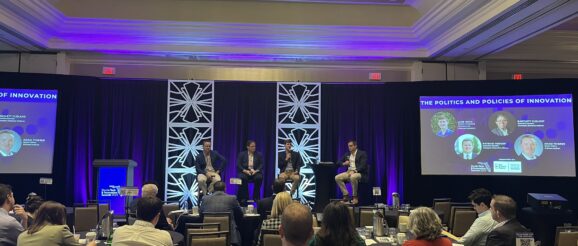James Madison Institute Tech & Innovation Summit looks at how policy impacts innovation

More than 100 thought leaders in technology from across the nation convened in Coral Gables Thursday to discuss how policy impacts innovation. It was part of the fourth annual Tech and Innovation Summit hosted by the James Madison Institute (JMI).
As a reflection of how quickly this industry evolves, JMI president Dr. Robert McClure noted that the issues on the table for discussion this year are far different from what was debated at the first (or even last year’s) summit.
“Technology is evolving so rapidly that it’s hard for people to keep up sometimes,” said McClure. “That’s why it’s so important to educate policymakers on the opportunities it brings to our state and nation and how regulations can help or hinder innovation.”
Multiple national think tanks like the Goldwater Institute, Americans for Tax Reform, the National Taxpayers Union, and the Libertas Institute were present. They contributed to discussions of how the nation and states can regulate technology without stifling innovation. Too aggressive restrictions can put the United States at a severe disadvantage in long-term global competitiveness.
“People don’t have to have a deep understanding of computing to use and benefit from all that technology has to offer,” said Rob Winterton, director of public affairs at NetChoice, a national association that advocates for technology. “Technology has an important role to play in solutions to many of the challenges we face. Whether it’s solving crime or responding to disasters, technology can have a big impact. Heavy-handed regulation can sometimes stand in the way.”
Many speakers pointed to the United Kingdom as “what not to do” regarding regulation. The U.K. has adopted restrictive policies without the right to freedom of speech, effectively hindering innovation. As a result, not one of the top 10 tech companies worldwide is headquartered there.
Attendees at the summit consistently voiced that education and awareness are key.
“We have a history of fearing what we don’t know,” said Brooke Medina, vice president of communications at the John Locke Foundation. “The more that our lawmakers and the broader public understand technology, the greater we will comprehend how technology can benefit our businesses, our law enforcement and our teachers, among others.”
Education and awareness were also underscored during a panel discussion on online child safety. There are dozens, if not hundreds, of tools and resources to support families as their children or youth begin to use devices. These tools can prevent minors from accessing dangerous content and enable their parents to monitor activity. Significantly, with these tools in place, students can benefit from exposure to technology so that they can learn, prepare for a future career and capitalize on all the benefits of technology.
“The digital literacy bill passed in Florida this year is a great solution. It enables teachers to educate students in the classroom about how to safely use technology,” said former state Rep. Justin Hill from Missouri. “Plus, it makes the curriculum available to the parents so they can apply what’s learned at home.”
The post James Madison Institute Tech & Innovation Summit looks at how policy impacts innovation appeared first on Florida Politics – Campaigns & Elections. Lobbying & Government..
